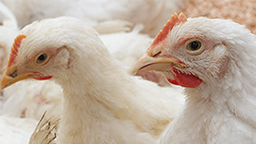The National Veterinary Services Laboratories has confirmed Highly Pathogenic Avian Influenza (HPAI) in 1 of 5 pigs living on a small farm in central Oregon’s Crook County.
While NVSL confirmed HPAI in one pig, results on samples collected from the other four pigs are pending. This is the same farm where the Oregon Department of Agriculture, partnering with the U.S. Department of Agriculture, humanely euthanized 70 HPAI-affected backyard birds last week. ODA State Veterinarian Ryan Scholz placed a quarantine on the property, and ODA’s veterinary team is conducting surveillance.
While HPAI confirmation is not unexpected due to the previous detection on the premises, this is the first HPAI detection in pigs.
All five pigs and the 70 birds on the property were humanely euthanized to prevent the further spread of the highly contagious virus. None of the animals on the farm entered the food supply chain, nor were they intended for the commercial food market.
The livestock and poultry on this farm shared water sources, housing, and equipment; in other states, this combination has enabled transmission between species.
It’s important to note that when properly prepared and cooked, HPAI does not affect meat or egg products, and these food items remain safe. The U.S. Centers for Disease Control (CDC) also recommends choosing pasteurized milk and dairy products to protect your health and your family’s health.
HPAI is a serious disease. ODA, USDA, the Oregon Health Authority (OHA), and Crook County Public Health responded quickly and according to established One Health response plans. These plans include implementing quarantine restrictions, humanely euthanizing affected flocks and animals, disposing of affected birds and animals, cleaning and eliminating the virus from affected premises, conducting surveillance, and monitoring individuals exposed to infected animals. ODA provided the animal owners with personal protective (PPE) equipment, and Crook County Public Health and OHA are educating and monitoring exposed individuals.
While these response efforts are critical in ending the outbreak, there are also actions bird and livestock owners can take to help stop the spread of the virus.
Biosecurity measures can include:
- Preventing exposure of domestic poultry and livestock to wildlife, especially wild waterfowl
- Limiting the co-mingling of different species of livestock, especially poultry and pigs
- Wash your hands before and after handling your flock
- Cleaning vehicles, tools, or equipment
- Limiting unnecessary visitors
- Sanitizing shoes in clean foot baths
- Changing clothes upon contact with birds.
The current strain of HPAI circulating in the U.S. and worldwide is endemic in wild birds, causing outbreaks in poultry, wild mammals, including seals and sea lions, and domestic animals, including dairy cows. HPAI has been confirmed in dairy cattle in 14 states, including California and Idaho. Oregon has no confirmed HPAI cases in dairy cattle. The U.S. Food and Drug Administration says it is safe to eat properly handled and cooked eggs and beef in the U.S., the risk of HPAI spreading to people from animals is extremely low.
The USDA says it continues to invest heavily in vaccine research and development as a tool to help stem and potentially stop the spread of this virus among animals. USDA has approved two vaccine field safety trials for vaccine candidates designed to protect dairy cows from H5N1, and continues to explore vaccine options for other species.

